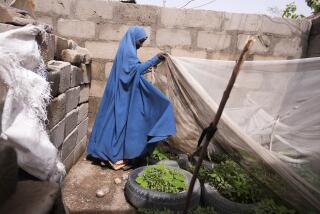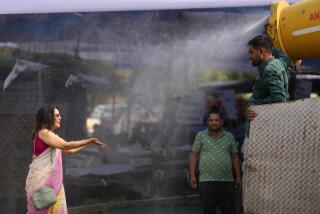U.N. Cites Children’s Heavy Death Toll
- Share via
At least 14 million children are dying each year from the “silent emergency” of infection and malnutrition, according to a United Nations report released Wednesday.
The United Nations Children’s Fund (UNICEF) report challenges nations on moral grounds to implement low-cost health and prevention programs that could easily save up to half of those lives.
“No loud emergency, no famine, no drought, no flood, has ever killed 280,000 children in a week. Yet that is what the silent emergency is now doing every week,” the report said.
Such deaths are primarily caused by childhood diseases such as measles and typhoid fever and by severe bouts of diarrhea, which worsen the malnutrition already present in many Third World children.
‘Obscene’ to Let It Go On
“Surely the time has come to say that it is obscene to let this continue day after day, year after year, as our civilization moves into the 21st Century,” the report said.
Within the next decade, as many as 7 million lives a year could be saved through inexpensive vaccines and oral rehydration programs, according to James Grant, UNICEF’s executive director. Oral rehydration is a simple method of preventing the lethal loss of bodily fluids, caused by severe diarrhea, by giving patients salt mixtures.
In UNICEF’s 40th annual State of the World’s Children report, Grant called on the industrialized nations to address the problem with the same fervor and moral conscience as it does in famines and droughts.
Information Program
While the expertise of health professionals is an important part of such programs, the report said the programs will be successful only by mobilizing every possible means of informing the population about oral rehydration, immunization, proper nutrition and other related information. These methods include seeking the cooperation of schools, the mass media, unions, religious leaders and other elements of society to spread the word.
Such social mobilization, Grant said, saved 1.5 million young lives last year.
Whereas the central challenge to implementing oral rehydration and immunization programs once was scientific or technical, it is now political and social, he added.
“No country in the world today with a serious intent to immunize its children will not have the resources available,” said Dr. William Foege, director of UNICEF’s Task Force for Child Survival.
“The deaths of these children, and the suffering of their families, cannot be framed in the view finder of a camera,” the report said. “They are therefore not news. And the world is not moved to emergency action on their behalf.”
More to Read
Sign up for Essential California
The most important California stories and recommendations in your inbox every morning.
You may occasionally receive promotional content from the Los Angeles Times.










